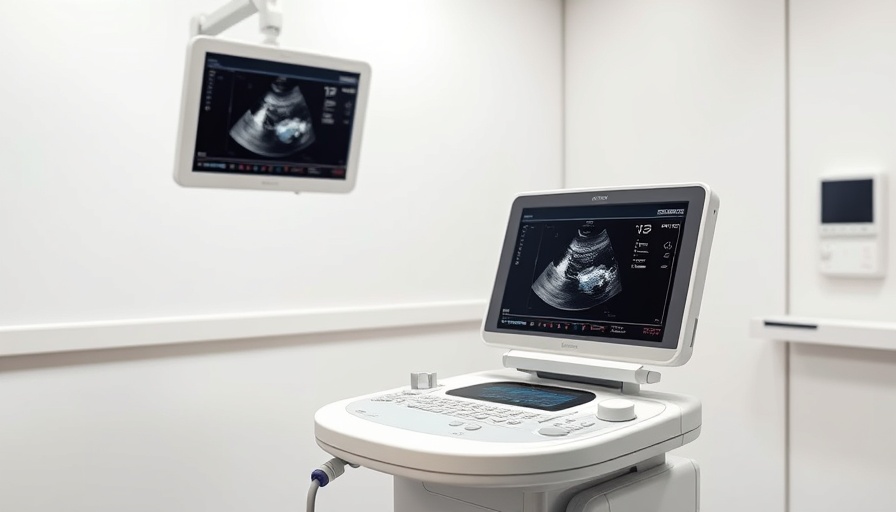
Understanding the Challenge: The 'Closed Loop' Learning Barrier
Point-of-care ultrasound (POCUS) has revolutionized how medical professionals diagnose critical conditions at the bedside. However, a concerning trend is emerging in the medical community—doctors trained in this life-saving technique often abandon its use shortly after undergoing training. This issue, highlighted by a recent study from the Universities of Cambridge and Exeter, reveals systemic barriers that prevent clinicians from integrating POCUS into their daily practice.
What Makes POCUS So Vital?
POCUS allows doctors to perform immediate, portable scans that can identify obstructive and life-threatening issues such as heart failure or internal bleeding. The urgency of addressing these conditions cannot be overstated; timely diagnosis can lead to swift interventions that save lives. Yet, despite the thousands of doctors trained in this technology in the UK, many fail to make POCUS a part of their routine medical practice.
Breaking Down Barriers: The 'Vicious Cycles'
The study identifies six key "vicious cycles" that contribute to the underutilization of POCUS, primarily stemming from insufficient expert support and workplace cultures that discourage less-experienced practitioners from utilizing this technology. The findings highlight the need for hospitals to foster environments that encourage the continuous use of POCUS so that the substantial investments in training are not wasted.
Implications for Patient Care: Why Does It Matter?
The ramifications of not using POCUS can directly impact patient outcomes. Reports such as the "Shock to Survival" framework underscore how critical timely intervention can be in managing conditions like cardiogenic shock. Moreover, evidence from the Prevention of Future Deaths reports reveals missed opportunities for intervention that could stem from the underutilization of point-of-care cardiac scans among critically ill patients, raising potential ethical concerns regarding patient care standards.
Future Predictions: The Path Forward for POCUS
As the demand for more integrated, technology-driven healthcare solutions in the wake of the ongoing digital transformation continues, the significance of training in POCUS cannot be ignored. Hospitals must prioritize the establishment of supportive cultures that will not only encourage its adoption but also refine the training processes involved, ensuring that healthcare practitioners maintain and enhance their competencies over time.
Counterarguments: Addressing Concerns Around POCUS
Some may argue that the focus on POCUS represents an over-reliance on technology in clinical practice. However, it's crucial to understand that POCUS is not intended to replace traditional diagnostic methods. Instead, it serves as a supplementary tool that enhances clinical decision-making, especially in emergencies where speed is critical. Addressing fears of technology replacing clinician intuition is essential.
Actionable Insights for Healthcare Practitioners
For concierge healthcare practitioners, staying informed about trends such as POCUS can create significant advantages in patient care. Here are some steps to consider:
Advocate for Training: Push for continued training and workshops on the practical use of POCUS as part of ongoing professional development.
Cultivate a Supportive Environment: Encourage a work culture that values innovation and technology in patient care.
Engage with Educators: Collaborate with medical educators to adapt training programs that address workplace culture challenges.
This proactive approach not only enhances the capabilities of healthcare professionals but significantly elevates the quality of patient outcomes.
Conclusion: Taking Action for Better Patient Outcomes
The need for timely and effective diagnosis has never been more critical in the world of healthcare. It is incumbent upon healthcare practitioners to recognize that the underutilization of potentially life-saving technology like POCUS represents a gap in patient care that must be actively addressed. As we navigate the evolving landscape of medical technology, let us ensure that systems are in place to support and integrate essential training, allowing practitioners to harness the full potential of their medical training.
If you are a healthcare practitioner looking to stay ahead of the curve, consider advocating for initiatives that support the uptake of bedside ultrasound technologies within your practice. Your patients’ health may depend on it!
 Add Row
Add Row  Add
Add 






Write A Comment